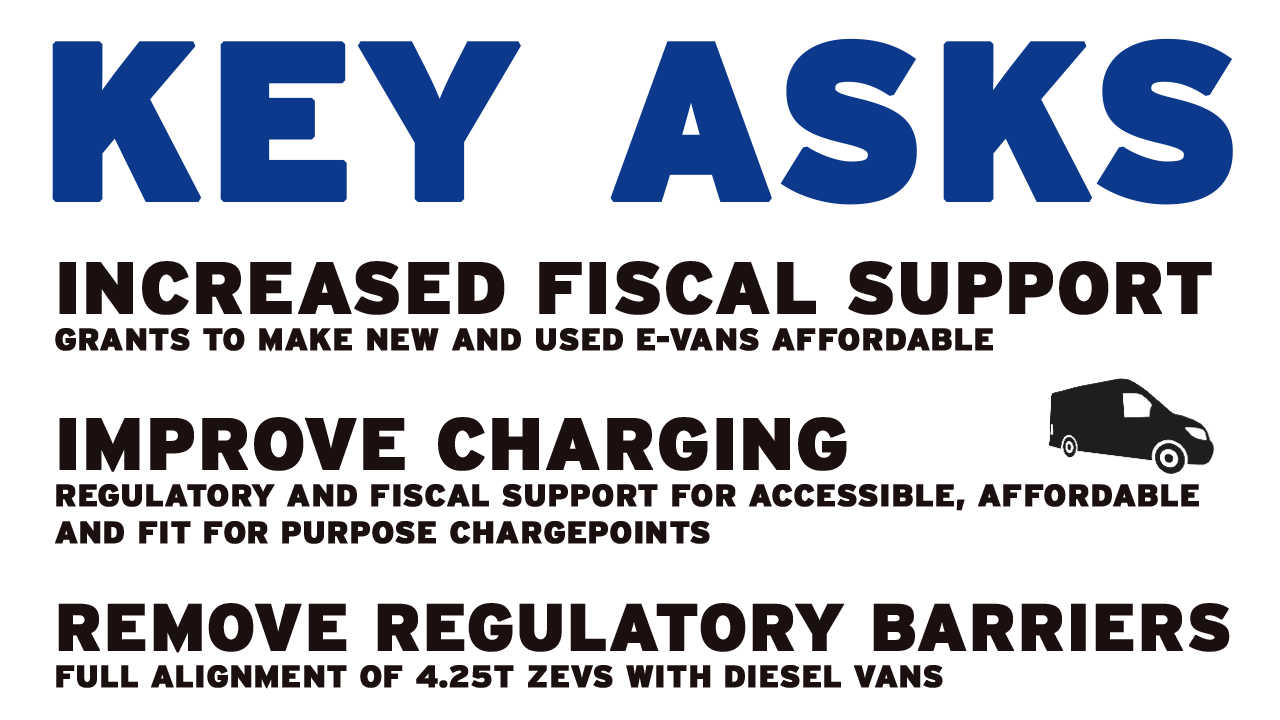Vans are the workhorses of the UK economy. One in ten workers – 3.4 million people – rely on a van for their job across a broad range of industries, from engineering and construction to emergency and rescue services. Commercial vehicles are the fastest growing part of the vehicle parc, however, as the latest Climate Change Committee progress report warns, ‘e-van sales are still lagging and remain significantly off track’.
Fleet operators are eager to make the transition to zero emission vans work but are struggling. Challenges with infrastructure – both public and private, regulation, as well as affordability and availability of suitable product are holding back their ability to move to zero emission vans.
To meet the 70% ZEV target for vans by 2030 operators need critical support now. A giant leap is needed to move the market from 5.9% of new e-van sales in 2023 to where it needs to be. Without immediate support the transition will continue to stall or even grind to a halt, making the targets in later years impossible to reach.

Contact your MP now

The Zero Emission Van Plan is a joint campaign by the BVRLA, Logistics UK, RECHARGE UK, the Association of Fleet Professionals (AFP) and the EV Cafe.

“Vans are the backbone of our economy, providing an essential form of transport and a mobile workspace. They are growing in number every year and account for a major portion of the miles driven up and down the country. If the UK is to meet its road decarbonisation targets, zero-emission vans must take centre stage. They are a vital player in the transition and command more attention.”
Gerry Keaney, Chief Executive of the British Vehicle Rental and Leasing Association (BVRLA)
“RECHARGE UK are pleased to be associated with this vital report to get electric van sales on track in the UK. Electric vans have a significant role to play in the transition to net zero, providing significant benefits to the van drivers and operators but also for providing flexibility services. We therefore see it as vital that the recommendations in this report are urgently adopted in order to ensure a fast, and fair transition to net zero for van drivers and fleet operators in the UK, that will maximise the positive effects for the wider energy system and environment.”
Dr Nina Skorupska CBE, Chief Executive of the REA
“Electric vans are integral to growing the economy and reducing harmful emissions. Targeted government support is required to accelerate the transition to zero emission vans to pump prime the logistics EVolution."
John Curtis, Director of Operations of The EV Café
“The logistics sector remains fully committed to decarbonising and has already made significant progress to do so. However, to deliver a fair transition to a green economy that keeps costs down for customers and goods moving from A to B, van operators need meaningful support. That means ensuring public chargepoints are accessible to commercial vehicles, removing regulatory barriers from and improving fiscal support for going electric, and tackling barriers with energy supplies. With logistics businesses, which operate on small margins, citing costs of £100,000 to over £1 million for upgrading energy supplies at depots, it’s clear that something needs to change if the UK is to achieve its Net Zero goals.”
David Wells, Chief Executive of Logistics UK
“Vans play an essential role in transporting equipment, supplies and people around the UK. There are a multitude of issues preventing our members, UK commercial vehicle fleet operators, from making the switch to electric vans – financial, charging and regulatory. It is essential that action is taken now to get the transition to electric vans on track and enable everybody to reap the benefits.”
Paul Hollick, Chair of the Association of Fleet Professionals (AFP)
